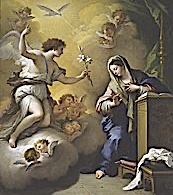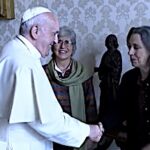Illustration: The Annunciation by Paolo de Matteis, 1712, Saint Louis Art Museum, Saint Louis. The white lily in the angel’s hand is symbolic of Mary’s purity
Full Text: Pope Francis’ Homily on the Solemnity of the Annunciation
Pope Francis celebrated Mass on the Solemnity of the Annunciation
March 25, 2022 from St. Peter’s Basilica.
The Evangelist Luke could only know this from the account of Our Lady.
Listening to Luke, we listened to Our Lady recount this mystery. We’re before a mystery.
Perhaps the best that we can do is to reread this passage, thinking that it was Our Lady who told it.
(this quotation is from Pope Francis’s Santa Marta Mass on 25 March 2020).
The homily below is from 25th March 2022.
Gospel (Luke 1:26-38)
The angel Gabriel was sent by God to a town in Galilee called Nazareth, to a virgin betrothed to a man named Joseph, of the House of David; and the virgin’s name was Mary. He went in and said to her, ‘Rejoice, so highly favoured! The Lord is with you.’ She was deeply disturbed by these words and asked herself what this greeting could mean, but the angel said to her, ‘Mary, do not be afraid; you have won God’s favour. Listen! You are to conceive and bear a son, and you must name him Jesus. He will be great and will be called Son of the Most High. The Lord God will give him the throne of his ancestor David; he will rule over the House of Jacob for ever and his reign will have no end.’ Mary said to the angel, ‘But how can this come about, since I am a virgin?’ ‘The Holy Spirit will come upon you’ the angel answered ‘and the power of the Most High will cover you with its shadow. And so the child will be holy and will be called Son of God. Know this too: your kinswoman Elizabeth has, in her old age, herself conceived a son, and she whom people called barren is now in her sixth month, for nothing is impossible to God.’ ‘I am the handmaid of the Lord,’ said Mary ‘let what you have said be done to me.’ And the angel left her.
The homily below is from 25th March 2022
Dear Brothers and Sisters,
In the Gospel reading for today’s Solemnity, the Angel Gabriel speaks three times to the Virgin Mary. The first is when he greets her and says, “Rejoice, full of grace, the Lord is with you” (Lk 1:28). The reason for rejoicing, the reason for joy, is revealed in these few words: the Lord is with you. Dear brother, dear sister, today you can hear those words addressed to you. You can make them your own each time you approach God’s forgiveness, because there the Lord tells you, “I am with you”.
Too often, we think that confession is about going to God with a dejected look. But it is not so much that we go to the Lord, as that He comes to us, to fill us with His grace, to fill us with his joy. Our confession gives the Father the joy of resurrecting us up once more. It is not so much about our sins as it is about his forgiveness.
Think about it: if our sins were the focus of the sacrament, almost everything would depend on us, on our repentance, our efforts, our resolutions. Far from it. The sacrament is about God, who liberates us and puts us back on our feet.
Let us once again recognize the primacy of grace and ask for the gift of recognizing that reconciliation is not first and foremost our drawing near to God, but his embrace that embraces us, amazes us and overwhelms us. The Lord enters our home, as he did Mary’s in Nazareth, and brings us unexpected amazement and joy.
Let us first look at things from God’s perspective: then we will rediscover our love for confession. We need it, because every interior rebirth, every spiritual renewal, begins there, from God’s forgiveness. May we not neglect reconciliation, but rediscover it as the sacrament of joy. Yes, joy, because our shame for our sins becomes the occasion for an experience of the warm embrace of the Father, the gentle power of Jesus who heals us, and the “motherly tenderness” of the Holy Spirit. This is the heart of confession.
And you, dear brother priests who are ministers of God’s forgiveness, offer the joy of this proclamation to those who come to you: Rejoice, the Lord is with you. Leave aside rigidity, obstacles and harshness; may you be doors wide open to mercy! Especially in confession, we are called to act in the person of the Good Shepherd who takes his sheep into his arms and cradles them. We are called to be channels of grace, pouring the living water of the Father’s mercy into dry hearts.
The angel spoke to Mary a second time.
She was troubled by his greeting, and so he tells her, “Do not be afraid” (v. 30).
In the Scriptures, when God appears to those who receive him, he likes to say these words: Do not be afraid! He said it to Abraham (cf. Gen 15:1), he repeats it to Isaac (cf. Gen 26:24), to Jacob (cf. Gen 46:3) and so on, up to Joseph (cf. Mt 1:20) and Mary.
In this way, he sends us a clear and consoling message: once our lives are open to God, fear can no longer hold us in bondage
Dear sister, dear brother, if your sins frighten you, if your past worries you, if your wounds do not heal, if your constant failures discourage you and you seem to have lost hope, do not be afraid. God knows your weaknesses and is greater than your failings. He asks one thing of you: that you not keep your weaknesses and sufferings inside. Bring them to Him, place them before Him and, instead of being reasons for despair, they will become opportunities for resurrection. Do not be afraid!
The Blessed Virgin Mary accompanies us: she cast her own fear on God. The angel’s announcement gave her good reason to be afraid. He was proposing something unimaginable and beyond her capacity, something that she could not handle alone: there would be too many difficulties, problems with the Mosaic Law, with Joseph, with the citizens of her city and with her people. But Mary did not object. Those words – do not be afraid – were enough for her; God’s reassurance was enough for her. She clung to him, just as we want to do tonight.
Yet so often we do just the opposite. We start with our own certainties and, when we lose them, we turn to God. Our Lady, on the other hand, teaches us to begin from God, trusting that in this way everything else will be given to us (cf. Mt 6:33). She invites us to go to the source, to the Lord, who is the ultimate remedy for the fear and emptiness of life. Here in the Vatican, there is a beautiful sentence above a confessional that reminds us of this. It addresses God with these words, “To turn away from you is to fall, to turn back to you is to rise, to abide in you is to have life” (cf. Saint Augustine, Soliloquies I, 3).
In these days, news reports and scenes of death continue to enter our homes, even as bombs destroy the homes of many of our defenceless Ukrainian brothers and sisters. The vicious war that has overtaken so many people, and brought suffering to all, has made each of us fearful and anxious. We feel our helplessness and our inadequacy. We need to be told, “Do not be afraid”.
But human reassurance is not enough. We need the closeness of God and the certainty of his forgiveness, which alone eliminates evil, disarms resentment and restores peace to our hearts. Let us return to God and to his forgiveness.
A third time the angel speaks to Mary and says: “The Holy Spirit will come upon you” (Luke 1:35). This is how God intervenes in history: by giving his own Spirit. For in the things that matter, our own strength is not enough. By ourselves, we cannot resolve the contradictions of history or even those of our own hearts. We need the wisdom and gentle power of God which is the Holy Spirit. We need the Spirit of love to dispel hatred, to soothe bitterness, to extinguish greed and to rouse us from indifference.
We need God’s love, because our love is fragile and insufficient. We ask the Lord for many things, but how often we forget to ask him for what is most important and what He most desires most to give us: the Holy Spirit, the power to love.
Indeed, what can we offer the world without love? It has been said that a Christian without love is like a needle that does not sew: it stings, it wounds, and if it does not to sew, weave or mend, it is useless. That is why we must find in God’s forgiveness the power of love: the same Spirit that descended on Mary.
If we want the world to change, then first our hearts must change. For this to happen, let us allow Our Lady to take us by the hand. Let us contemplate her Immaculate Heart in which God dwelt, “the lonely boast of our depraved nature”. Mary is “full of grace” (v. 28), and therefore free from sin. In her, there is no trace of evil and therefore, with her, God could begin a new history of salvation and peace. There, in her, history took a turn. God changed history by knocking at the door of Mary’s heart.
Today, renewed by God’s forgiveness, may we also knock at the door of her Immaculate Heart. In union with the Bishops and the faithful of the world, I wish to solemnly offer to the Immaculate Heart of Mary all that we are experiencing. I wish to renew to her the consecration of the Church and of all humanity, and to consecrate to her in a special way the Ukrainian people and the Russian people who, venerate her as a Mother of filial affection.
This is not a magic formula but a spiritual act. It is an act of total trust on the part of children who, in the midst of this cruel and senseless war that threatens our world, turn to their Mother, placing all their fears and pains in her heart and entrusting them to her. It is to place in that pure and immaculate heart, in which God is reflected, the inestimable goods of fraternity and peace, all that we have and all that we are, so that she, the Mother whom the Lord has given us, may protect us and watch over us.
Mary then uttered the most beautiful words that the angel could bring back to God: “Let it be to me according to your word” (v. 38). Hers was not a passive or resigned acceptance, but a living desire to obey God, who has “plans for good and not for evil” (Jer 29:11). Hers was the most intimate participation in God’s plan of peace for the world.
We consecrate ourselves to Mary in order to enter into this plan, to place ourselves totally at the disposal of God’s plans. After uttering her “Fiat”, the Mother of God set out on a long journey to the hill country, to visit a relative who was with child (cf. Lk 1:39). May she now take our own journey into her hands: may she guide our steps along the steep and arduous paths of fraternity and dialogue, along the way of peace.


